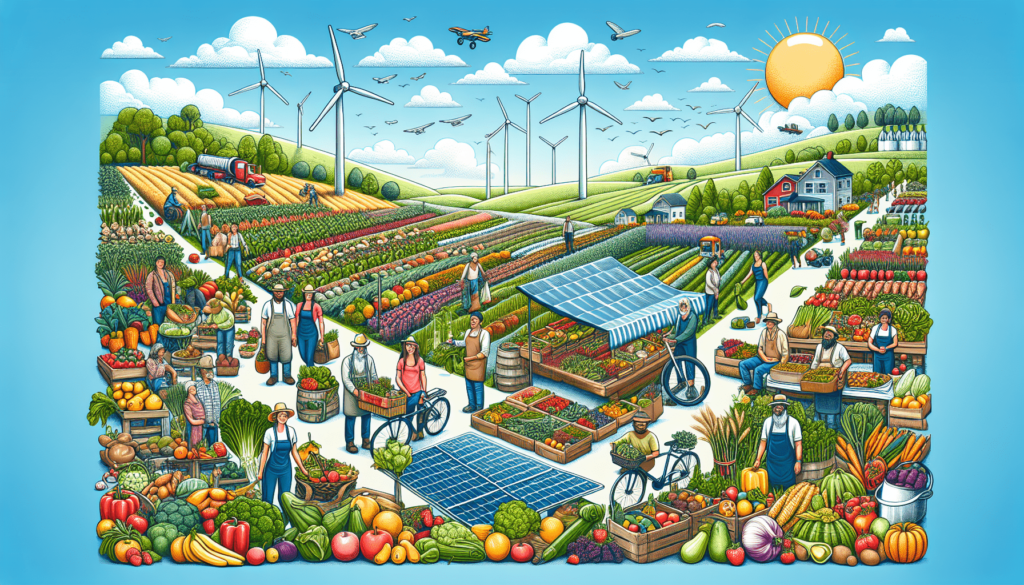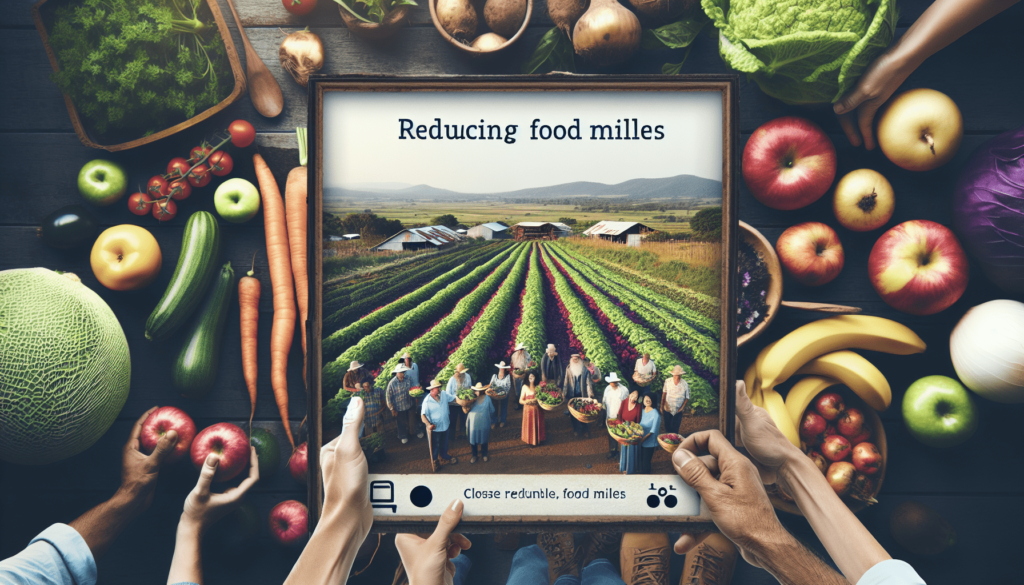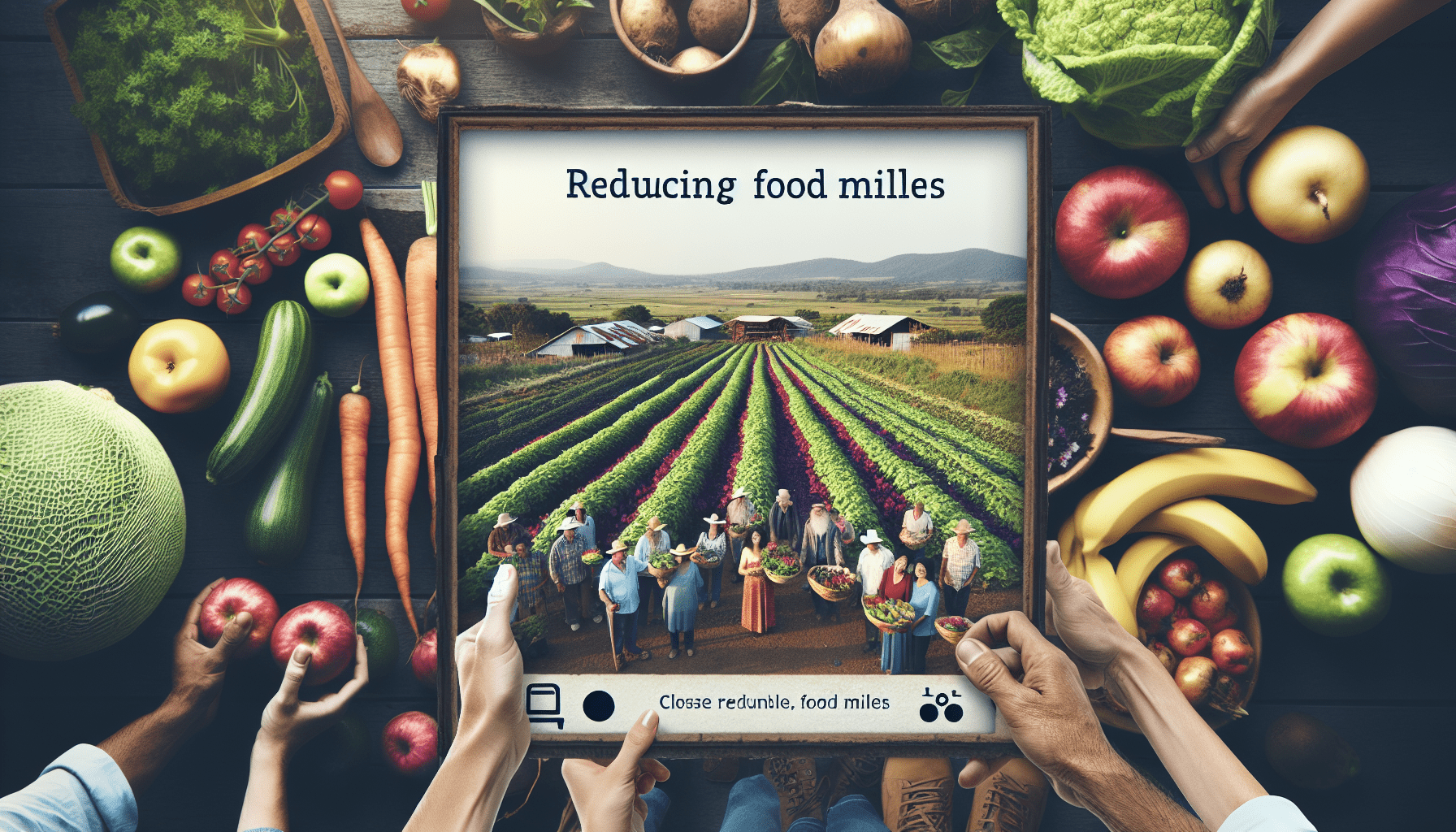Picture this: you’re standing in the middle of a bustling supermarket, surrounded by rows upon rows of fresh produce, canned goods, and packaged snacks. As you grab a lemon from the pile, have you ever stopped to think about where that lemon came from? How far did it travel to reach your local store? This is where the concept of “food miles” comes into play. In today’s globalized world, it’s crucial for us to understand the importance of reducing food miles and the benefits it brings to our planet and our communities. From supporting local farmers to reducing greenhouse gas emissions, let’s explore why minimizing the distance our food travels is not just a trend but a necessity.
1. Environmental Impact
The first and perhaps most crucial reason for reducing food miles is the positive environmental impact it can have. By decreasing the distance that food travels from farm to plate, we can significantly reduce greenhouse gas emissions. When food is transported over long distances, whether by plane, train, or truck, it contributes to the release of harmful carbon dioxide into the atmosphere. This greenhouse gas is a major contributor to climate change. By supporting local food systems, you are helping to minimize these emissions and combat global warming.
In addition to reducing greenhouse gas emissions, supporting local food systems also promotes the conservation of natural resources. Industrialized agriculture and large-scale food production often require large amounts of water, energy, and chemicals. By choosing locally grown food, you are supporting more sustainable farming practices that use fewer resources. This not only benefits the environment but also helps to preserve our precious natural resources for future generations.
Another environmental benefit of reducing food miles is the decreased air pollution. The transportation of food over long distances often involves the burning of fossil fuels, which releases pollutants into the air. These pollutants, such as nitrogen oxides and particulate matter, can have detrimental effects on both human health and the environment. By consuming locally produced food, you are reducing the need for long-distance transportation and, consequently, the amount of air pollution produced.
2. Food Freshness and Quality
When it comes to food, freshness and quality are of utmost importance. Choosing locally grown food ensures that you are getting the freshest produce available. Locally sourced food has a shorter time between harvest and consumption, which means it spends less time in transit and on the shelf. This shorter time frame allows for optimal freshness and flavor, as nutrients are retained and flavors are not diminished.
In addition to enhanced freshness, locally grown food also offers improved quality. Many large-scale food producers prioritize shelf life and durability over taste and nutrition. This often leads to the use of preservatives and the sacrifice of flavor and nutritional value. However, local farmers can focus on producing high-quality, flavorful, and nutritious food without the need for excessive preservatives. By supporting local food systems, you are choosing food that is not only fresh but also of superior quality.

3. Support Local Economy
Choosing locally grown food has significant economic benefits for your community. By supporting local farmers and producers, you are directly contributing to job creation. Local agriculture relies heavily on small-scale farmers, who often hire local labor to support their operations. This means that your choice to buy local not only supports farmers but also creates employment opportunities for individuals in your community.
Moreover, buying local food also generates income for local farmers. Instead of purchasing mass-produced items from faraway places, your investment goes directly back into the hands of the farmers who work hard to grow the food you enjoy. This income can then be reinvested in the community, helping to strengthen local businesses and promote economic growth.
Supporting local food systems also contributes to strengthening local businesses. When you buy local, the money you spend stays within the community, circulating and benefiting other local businesses. This multiplier effect fosters a thriving local economy, creating a sense of vibrancy and entrepreneurship in your community.
4. Food Security
Food security refers to the availability, access, and utilization of food for all individuals within a community or country. By reducing food miles and supporting local food systems, we can enhance food security in several ways.
Firstly, dependence on imports can present a significant challenge to food security. Relying heavily on food from distant regions or countries exposes communities to potential disruptions in supply chains. Natural disasters, political instability, or even global pandemics can halt the flow of imported food, leading to shortages and increased food prices.
By consuming locally produced food, communities can reduce their reliance on imports and increase their self-sufficiency. This not only ensures a more stable food supply but also reduces vulnerability to external disruptions.
Furthermore, supporting local food systems provides better access to fresher and more affordable food. Local farmers are better equipped to meet the specific needs and preferences of their community. They can grow a diverse range of food that aligns with local tastes and nutritional needs. Additionally, shorter transportation distances mean that food reaches consumers faster and with minimal spoilage. This translates to a wider variety of fresh, healthy, and affordable food options for all members of the community.

5. Waste Reduction
Reducing food miles plays a crucial role in minimizing food waste, an issue that has significant environmental, social, and economic implications. Food waste occurs at various stages of the supply chain, including production, distribution, and consumption. Reduction in food miles can help address this issue in multiple ways.
Firstly, by consuming locally grown food, you are supporting a more efficient food system. Locally produced food does not have to travel long distances, reducing the chances of spoilage and waste during transportation. Additionally, local farmers are often more adept at accurately predicting demand and adjusting their production accordingly. This means that less food is wasted due to overproduction or unsold inventory.
Furthermore, reducing food miles also contributes to a reduction in packaging waste. Long-distance transportation often requires excessive packaging to protect food during transit. By supporting local food systems, you are opting for products that require minimal packaging, reducing both waste and the environmental impact of packaging materials.
In addition to minimizing food and packaging waste, supporting local food systems promotes the efficient use of resources. Locally grown food tends to require fewer resources such as water, energy, and chemicals. By choosing food that has been produced sustainably and locally, you are supporting agriculture practices that prioritize resource conservation.
6. Health Benefits
Choosing locally grown food offers numerous health benefits that extend beyond the basic consumption of essential nutrients. Here are some of the key health advantages associated with supporting local food systems:
Increased consumption of locally grown produce: Locally sourced food is often harvested at peak ripeness, ensuring maximum nutrient content. Consuming fruits and vegetables at their freshest and most nutritious state can have a positive impact on your overall health and well-being. Moreover, local farmers often cultivate a wider variety of produce, exposing you to a more diverse and nutrient-rich diet.
Lower risk of contamination: Large-scale food production and long-distance transport can increase the risk of contamination. By choosing locally grown food, you are reducing the number of intermediaries involved in the supply chain. This minimizes the potential points of contamination and ensures that you are getting food that has been grown and handled with care.
Support for sustainable farming practices: Many local farmers prioritize sustainable and organic farming methods that minimize the use of chemical pesticides and herbicides. By supporting local food systems, you are encouraging these sustainable practices and reducing your exposure to potentially harmful chemicals.
7. Climate Change Mitigation
The impact of our food choices extends beyond our immediate health and well-being. By supporting local food systems, we can actively contribute to climate change mitigation.
One of the key ways that reducing food miles helps mitigate climate change is by reducing reliance on energy-intensive transportation. Long-distance transportation of food requires significant amounts of fossil fuels, contributing to greenhouse gas emissions. By choosing locally grown food, you are minimizing the need for long-haul transportation and decreasing your carbon footprint.
Furthermore, supporting local food systems also contributes to resiliency against climate-related challenges. As the effects of climate change become increasingly apparent, local food systems that prioritize sustainable and regenerative farming practices are better equipped to adapt to changing environmental conditions. By supporting these practices, you are promoting the development of resilient local food systems that can withstand the challenges posed by climate change.
8. Preservation of Biodiversity
Supporting local food systems fosters the preservation of biodiversity, both in terms of natural habitats and agricultural practices.
The production of mass-market food often relies on monoculture, the practice of growing a single crop over large areas. This reduces biodiversity and can contribute to the loss of native habitats and the extinction of certain species. By choosing locally grown food, you are supporting small-scale farmers who tend to prioritize crop diversity and the use of regenerative practices that promote biodiversity.
Moreover, local food systems also foster the preservation of traditional and diverse agricultural practices. Many local farmers grow heirloom varieties of fruits and vegetables, preserving genetic diversity and cultural heritage. By supporting these farmers, you are contributing to the continuation of these unique agricultural practices and the protection of traditional knowledge.
9. Community Engagement
Reducing food miles goes beyond the act of purchasing food; it also involves community engagement and connection. By choosing to support local food systems, you can actively participate in building stronger and more resilient communities.
Buying local food provides an opportunity to connect with the producers and gain a deeper understanding of where your food comes from. Many local farmers offer direct sales or community-supported agriculture programs, allowing consumers to engage directly with the people who grow their food. This connection helps build trust, fosters a sense of community, and strengthens the relationships between consumers and producers.
Moreover, supporting local food systems also promotes education and awareness about the importance of local food systems. By embracing local food, you can inspire others to make similar choices and spread the knowledge about the benefits of reducing food miles. Through educational initiatives, workshops, and events, you can actively contribute to building a more informed and connected community.
10. Ethical Considerations
Choosing to support local food systems also carries important ethical considerations. By reducing food miles and opting for locally grown food, you can actively promote fair treatment of farmers and workers, as well as the reduction of exploitation in global supply chains.
Buying mass-produced, long-distance food often means supporting agricultural practices that may compromise the well-being of farmers and workers. Many of these practices involve the exploitation of labor, with workers being subjected to low wages and poor working conditions. By choosing locally grown food, you are supporting farmers who prioritize fair treatment and sustainable farming practices, ensuring that those who grow your food are treated ethically and compensated fairly.
Furthermore, supporting local food systems allows you to encourage ethical production and trade practices. By choosing products that have been grown and produced within your community, you can be confident in knowing that your food has been produced in alignment with ethical standards. This conscious choice helps to promote the development of fair and sustainable food systems globally.

